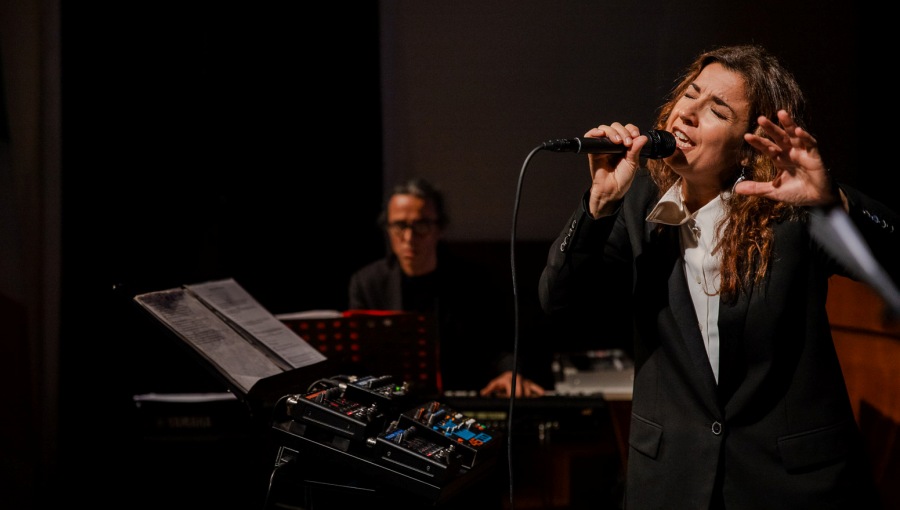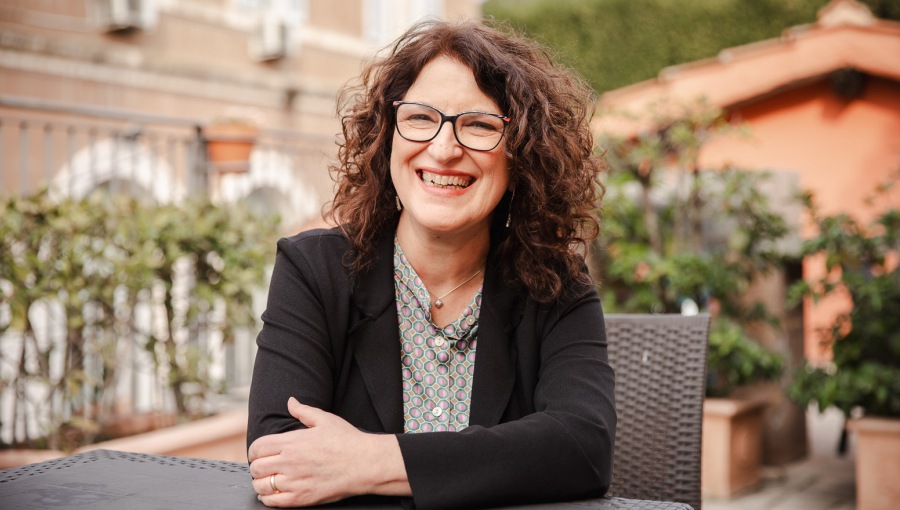JCU Presents "Staging Violence Against Women and Girls" by Luciana d'Arcangeli
The Department of Modern Languages and Literature welcomed Dr. Luciana d’Arcangeli on March 5 for a book presentation and theater reading entitled “Staging Violence Against Women and Girls.”
The volume Staging Violence Against Women and Girls (Methuen Drama, 2023), which d’Arcangeli edited with Daniela Cavallaro and Claire Kennedy, brings together three plays by contemporary international authors that denounce gendered violence, along with interviews with their creators and the practitioners who have staged them in different national contexts. In their interviews, the writers, directors, and producers discuss their conception and production of the works, highlighting the urgency of raising awareness of these forms of violence against women and giving voice to survivors.

Stage direction was curated by Duncan Rosso Vecchiarelli, an actor, musician, playwright, director, and translator/editor, who also read and provided musical accompaniment during the evening.
Professor Elena Grillo, who is currently teaching IT 307 Italian Language and Gender, gave a brief introduction to Luciana d’Arcangeli and her work. D’Arcangeli began by reading “Female Quotas” from Ferite a morte / Sisters Don’t Sleep aka Wounded to Death (2013), a theatrical project by Serena Dandini and Maura Misiti that aims to raise awareness and generate action to prevent femicide and intimate partner violence. “It’s easier for a camel to go through the eye of a needle than for a woman manager to get on a board of directors,” says the narrator, a woman who eventually does make it to the top of her career. But her husband took his wife’s success as an affront to his masculinity and their relationship turned toxic:
He was constantly belittling me. There was some deep-seated resentment there. The sarcasm was biting, the criticism endless, merciless, no matter what I did.
It was a constant onslaught, no holds barred, until one May night, when we’d just gotten home from a conference on interest rates, he dealt me the final blow: with a heavy cut glass ashtray thrown straight at my forehead. I was still alive; he could have saved me, but he just stood staring. I lay there struggling to breathe, finally powerless and docile. He’d brought me down to size.

He hadn’t meant to take it that far, but he had no other way to explain his feelings of inadequacy… I’d grown too fast for him; he just couldn’t keep up, couldn’t stand the comparison. He felt inferior. The only thing he had left to regain the upper hand was brute force. In that department, he was still superior to me.
At least he won the final match.
d’Arcangeli interspersed the dramatic readings with statistics, such as the fact that according to the UN, nearly 89,000 women and girls were killed intentionally in 2022, with 55% (48,800) of all female homicides committed by family members or intimate partners.
Next, Duncan Rosso Vecchiarelli read an excerpt from “Amina” from Passi affrettati / Hurried Steps (2007) by Dacia Maraini. Amina is a 23-year-old Nigerian woman, who was condemned to death by the law of her religion, Sharia, because she had a child out of wedlock:
It’s perfectly straightforward. The woman is buried in the earth, up to her shoulders, but so her neck and head are clearly visible. Then everybody in the village is called and they will bring stones with them. They have to hit her with these stones until she draws her last breath. The stones can’t be too big because they would kill her straight away, or too small because then they wouldn’t hurt her at all. When she is dead, her body is given back to her family to bury somewhere near the village.
D’Arcangeli then read from her book “Tina Lagostena Bassi’s closing statement” from Processo per stupro / A Trial for Rape (2018) by Renato Chiocca, who adapted the international award-winning 1979 documentary into a play. The play reveals how judicial procedures and attitudes toward sexual violence tend to turn rape survivors from accusers into accused. The original documentary was filmed in the tribunal of the city of Latina, in Italy’s Lazio region, and showed an audience of millions the proceedings of a rape trial on television for the first time. At that time, Italian law treated rape as a crime against public morality and decency, rather than as a crime against the person. It wasn’t until about 20 years later that the law was changed, and the criminal code revised.
In her statement, lawyer Lagostena Bassi, who represented the 18-year-old victim, says, “We demand justice as women. We mean that, in the courtrooms of this country, and in everything that takes place in those courtrooms, the social and cultural conception of women must change. The time has come to realize, to acknowledge, that a woman is not an object.”
The next piece that d’Arcangeli and Vecchiarelli read was “Mutant” by Karis E. Halsall (aka Karis Kelly) from Little Stitches (2014) by Isley Lynn, Raúl Quirós Molina, Bahar Brunton, and Karis E. Halsall. The latter is a collection of four one-act plays that tackle the subject of female genital mutilation from the points of view of bystanders, anti-FGM/C activists, health professionals, women who perpetuate the practice, and, finally, survivors.
“Mum’s face, turned away
Auntie’s face, approaching
The smell of smoke.
I’m held down,
my aunt’s knees in my chest.
Keeping me still.
As that woman
slices right into my
she slices right into my
right into my
Soul.
The sound I make
could curdle blood.”
Luciana d’Arcangeli
Originally from Rome, Dr. d’Arcangeli is the author of I personaggi femminili nel teatro di Dario Fo e Franca Rame (Cesati, 2008). She has also published widely in journals, and edited several books and special journal issues on Italian cinema and theatre. In 2021 she published Atti di accusa. Testi teatrali e interviste sulla rappresentazione della violenza contro le donne (co-edited with Claire Kennedy and Daniela Cavallaro). In 2018, d’Arcangeli created the Australasian Center for Italian Studies Inaugural Visual and Performance Studies Research Group, which she coordinated until 2022. After teaching Italian theater, cinema, and translation for 13 years at Flinders University in Adelaide, Australia, she is currently an adjunct professor, language consultant, translator, and interpreter based in Rome.
(Berenice Cocciolillo)





